- Hey Dullblog Online Housekeeping Note - May 6, 2022
- Beatles in the 1970s: Melting and Crying - April 13, 2022
- The Beatles, “Let It Be,” and “Get Back”: “Trying to Deceive”? - October 22, 2021
In the same vein as Norman’s 2005 Daily Mail “letter” to Paul, there’s the doggerel he wrote and published in the Sunday Times back in the early 1970s. I’ve seen references to its being longer than the four lines I can find online, but those four lines are more than enough:
“O deified Scouse, with unmusical spouse
For the cliches and cloy you unload
To an anodyne tune may they bury you soon
In the middlemost midst of the road.”
So, nothing like now having a biography from a writer who once publicly wished for the subject’s speedy death.
I’m sure Norman has changed somewhat in the past 30+ years, and I can believe that he’s genuinely mellowed on McCartney. But the more I look at the written record of Norman’s long resentment of McCartney, the more I see this biography as 1) an attempt to salvage Norman’s (wildly inflated, in my opinion) reputation as a Beatles “expert” and 2) a cash grab.
That 1970’s “poem” makes it absolutely clear that the venom spewed at McCartney in Shout! and that 2005 Daily Mail piece were slow-brewed and saved up. Neither the “poem” nor the “letter” tell us much about McCartney. But that Norman not only wrote them, but chose to publish them, does reveal the vital part McCartney plays in Norman’s own psychodrama.
 For those interested in other online forums discussing the Norman biography of McCartney, check out this long thread on the Steve Hoffman site.
For those interested in other online forums discussing the Norman biography of McCartney, check out this long thread on the Steve Hoffman site.
It’s a comfort to reflect that over time Norman’s work will be mostly, if not entirely, forgotten — while that of Lennon, McCartney, Harrison, and Starr will endure.
5/13/16, edited to add: Somewhat as Norman has apparently been compelled to revise his previous view of McCartney, I must add that I think I’ve been unfair to Norman here. My local library had the bio today, and in the introduction, “All Our Yesterdays,” Norman does a more thoroughgoing job of acknowledging his previous bias against McCartney, and its roots, that I expected. He admits it was “mad” to say that John was three-fourths of the Beatles during the interviews promoting Shout!, and that wishing for McCartney’s death in the poem quoted above “now looks horrifically tasteless.”
It’s still possible to argue that Norman’s only trying to salvage his reputation (he has to know that in the digital age, all his previous statements about McCartney will out), but the tone I hear in the introduction is of someone grappling with age and the difference of view it brings. Norman talks about having wanted to live McCartney’s life, and he seems to see that this desire explains a lot about his previous resentment of McCartney’s post-Beatles life and work. I haven’t read the book, so at this point I can only say that so far Norman’s surprised me just as much as he says McCartney surprised him by granting him “tacit approval” to write this book.
To me this highlights a few things that are salient in the Beatles’ saga and beyond:
- The degree to which many of us identify with celebrities and then get angry when they don’t measure up to our ideals
- How easy it is to get locked into a view of someone, and how unlikely it is that that person matches your estimation
- The way that, over time, the emotions of the moment can fade and enable a new view of events
I now feel I should give Norman a chance with this biography, just as he gave McCartney a chance to defy his expectations.

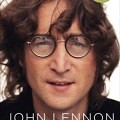
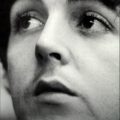

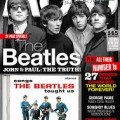

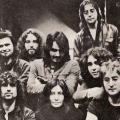
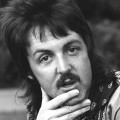
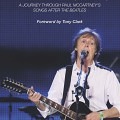


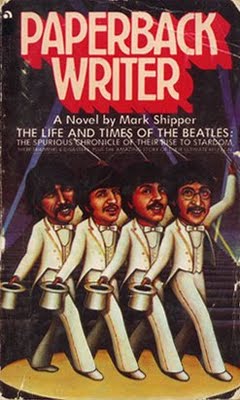
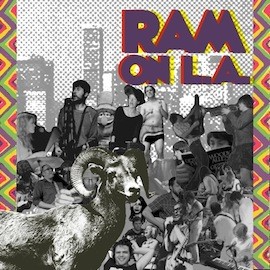
Oh. My. God. I forgot all about that damn poem.
You know, I highly doubt that someone with that degree of crazy-ass venom could have “reassessed” his opinion, even if it did take 30 years. I think you are absolutely correct, Nancy–Norman is trying to salvage his rep and at the same time make some dough. Why wouldn’t everyone, in Norman’s view, run out and buy a bio written by an author who had a 30-year hate-on but then had a come to Jesus moment?
And his work is still be lauded as the definitive work on the Beatles. [insert face palm]
I’ve noticed that too, Karen: virtually every review I’ve read of Norman’s Paul bio has
nothing but praise for Shout! There’s an acknowledgement that it Is viciously anti-Paul (occasionally an acknowledgement that it’s also anti-George, nothing about its dismissal of Ringo) and then that acknowledgement is followed by a description labeling it as the “Definitive” biography. That the book is blatantly biased against 3/4 of the Beatles structure — and that that bias infuses every aspect of Shout!, from musical evaluation to conclusions to the selection of evidence — is blithely shrugged off.
@Ruth, if you could collect the URLs for these reviews, I’d like to make a post with all of them. We’ve done that for big Beatle books before.
@Karen, the book is annoying, for sure, but no serious fan pays any mind to Shout! anymore. I didn’t even see it being sold at Beatlefest.
Shout was inevitable; you don’t get Beatle level fame and success without generating haters, and Norman is simply one of those. He’s not worth the breath it takes to refute him–not when there’s a Lewisohn out there doing it properly.
No serious fan, but it’s the neophytes I’m worried about.
Neophytes are going to self-sort. Those who want to learn, will keep reading. Those who don’t, can’t be helped. Really, I think anybody who is interested in the Beatles, is going to start with the anthology–probably video. Someone who randomly picks up shout… The scale of book reading is so small Karen; I would be shocked if shout sold more than 5000 copies worldwide every year, and it could Be much, much smaller than that.
That’s too true, Mike. I think many people get their pop culture “information” from YouTube videos and comments more than from any long-form written material. Which is pretty terrifying and makes Norman look like a Pulitzer-deserving historian by comparison.
Going back to Norman’s rhyme, my problem is with the last line. If Norman wants to make fun of McCartney’s music and Linda McCartney’s musical abilities, that’s certainly fair game. It’s the wishing publicly for someone’s death — even in jest — that I think goes too far. That kind of imprecation is out of bounds for me, expressed toward anyone.
I’m impressed that McCartney has been willing to correspond with Norman after his many bilious attacks. From the reviews I’ve seen, the biography is reasonably fair, though it also appears to have no significant new information or analysis. I think I’d be more interested in reading Norman’s account of how he changed his opinion on McCartney.
@Nancy, I do think that’s true — I think fans do get their info from video sources — but my point was more, anybody who’s vaguely interested in the Beatles who starts with Shout! — or Spitz, or Davies, or Goldman, or anything other than Anthology — is a bit perverse. And if they do that, either they’re going to become more interested (which is essentially the path everyone reading this comment took), or become less interested, making their opinion on Paul McCartney pretty meaningless.
The guy has done what he’s done. Fretting that casual fans think he’s a lightweight is like fretting that some people think Picasso was just making shit up. Idiots gonna idiot.
PS — I think Paul had no choice but to correspond with Norman. Well, or declare all-out war, and that’s not Paul’s style. As discussed.
You may well be right, on both counts.
“Idiots gonna idiot.”
I’m going to appropriate that one as my own. 🙂
My issue with Norman is more to do with my overall revulsion toward people LIKE Norman: biased, closed-minded, manipulative, disingenuous, self-serving.
I don’t suffer fools gladly–at least, that kind of fool. It’s how I roll, I guess. 🙂
Looks like Rolling Stone listed Shout! in their list of 10 best Beatles books! Yuck! http://www.rollingstone.com/music/lists/10-best-beatles-books-20160504
For a couple of days, I had wondered what had happened that I could not view the comments on this thread.
Anyway, regarding that poem, it’s too clever by half. I imagine the paper trail of venom spewed at Paul by Philip Norman, will play a big part in just how successful he’ll be in rescuing his reputation for history. He has behaved for too long like a jilted lover who had been kicked to the curb. His “biography as apology” is just a beginning to balancing the scales of his decades long campaign of “getting back at Paul”. He is real lucky that Paul is being magnanimus (regardless of whether Paul is being sincere or calculated). IMHO, he owes Paul big and “cosmic karma” has a way of collecting it’s due. Thanks Lewisohn!
my contribution to this thread…
http://orig15.deviantart.net/4c77/f/2011/223/9/1/facepalm_by_paulmaccaalexadark-d467ll0.jpg
The original facepalm. 🙂
Couldn’t agree more. It took me about five hours to discern that Norman’s touting of ‘tacit approval’ from McCartney is a smokescreen for one of the most blatant cut and paste biographies yet. There’s not a scrap of new information and much of the old is delivered from horse’s mouths and other biographers without attribution.
McCartney famously retitled Norman’s initial outing ‘Shout!’ as ‘Sh*te!’ and in that vein I would offer that this is ‘Double Sh*te and Chips’. Skip it.
That’s the thing: Did Norman modify his opinion because he realized he own inner, conflicted motivations, or does he have an ulterior motive? A lifetime of unbridled, illogical resentment isn’t readily overcome. It’s not been my experience, from a psychological perspective with clients, particularly older ones. But it’s possible.
I will remain a sceptic, but glad that Norman is attempting to correct the record, regardless of his intentions.
Karen, on the “letter” thread, Linda A says that in the McCartney bio Norman “obviously admires Linda and I think part of the reason is that the people he talked to loved and admired Linda.” I think a lot of Norman’s turnaround might be attributable to spending about three years writing this book, and finding in the process that many people have good things to say about McCartney. I wonder how much difference there is between the book Norman expected to write when he started, back in 2013, and the book he actually wrote.
I dunno, Nancy. I guess I’m a born skeptic. 🙂
Geoff Emerick, George Martin, and many others who held Paul in high regard back in the day when Norman wrote Shout! were around to shape Norman’s opinion of Paul, but yet those positive impressions made not one whit of impact upon Norman’s views. Shout! is confirmation bias at its worst: Norman hated his subject and wrote a book around it. He continued his diatribe until what– 2010? And then he wants us to believe he had a come to Jesus moment when writing this new bio, when evidence in support of McCartney was readily available 30 years ago?
I don’t like the man period. But, like I said, I’m glad he’s at least had the decency to write, by all accounts, a fair assessment of Macca. I give him much credit for that.
I see what you mean, Karen, and you may be right.
One other thought I had that *might* help explain Norman’s change of heart, assuming for the moment that it’s real, is that Norman has had some actual contact with McCartney over the past several years.
The McCartney depicted in Shout! reads like a screen Norman’s projected his feelings onto. I wonder if corresponding with McCartney and talking with people who know him well made it harder to keep projecting onto him in that way.
But I admit that I do want to believe that people can change for the better, so I may be giving Norman too much credit. I will have to see what I think after I read the book.
That’s a very reasonable and fair position to take, Nancy. And probably it doesn’t really matter what Norman’s personal views are, as long as his public treatment of the subject is fair and balanced.
I’m about 280 pages into the McCartney book, and it’s not very good. As has been mentioned, much of it in the Beatles section is a cut-and-paste job from Shout! or his Lennon biography from 2008. There are so many easily correctable errors (Capitol ordered 750,000 copies, not 75,000, of the “Butcher” cover; Eleanor Rigby has no electronic effects on it, so when Norman says Paul spent time making them in his music room, it presumably is a mistaken reference to Tomorrow Never Knows) that one wonders how much of the “new” information is accurate–which makes reading it a somewhat worthless exercise for the fan who already knows the big things.
Additionally, Norman makes zero effort to examine his subject. It’s clear he’s not really interested in Paul at all. Norman doesn’t tell us anything we don’t already know about McCartney–he was less screwed up than John, he had a greater work ethic, he was involved in the avant garde scene, he puts up a protective shell against the press. Norman never takes the opportunity to pry deeper into something–why did Paul like weed so much, for example. Rather the book reads as a sort of begrudgingly appreciative tome whose purpose is simply to sell copies to people who will buy something with Paul McCartney’s face on it to read at the beach. And don’t get me started on the ham-fisted foreshadowing mini-paragraphs (“little did Paul guess that he would one day be knighted by the Queen”). Also–inexcusably, to me–Norman doesn’t even report that between late 1966 and 1968, Paul was adventurous in a significantly non-artistic way–using cocaine. If the subject has publicly admitted to it, and it’s juicy, and it’s relevant (John’s on LSD or smack, Paul’s on coke, John whines that Paul’s “bossy”), why on earth not mention it?
Wow, Michael, that’s a significant oversight. The presence of cocaine in the Lennon/McCartney partnership during its pivotal period is as determinative as Lennon’s use of heroin was in the post-Yoko decay. IMHO, you simply cannot make sense out of John or Paul’s behavior — especially towards each other — without factoring in the distorting aspects of drugs. For example: Cocaine explains “Magical Mystery Tour” quite succinctly.
But then again, remember that Norman’s British, where the attitude towards chemical use/abuse is peculiar. Paul’s cocaine use might well have seemed like a salacious detail… when of course it’s just the opposite. It’s no more a salacious detail than Julia being killed by a drunk off-duty policeman. Though it is not quantifiable, it is a key to the story.
Completely agreed, Michael. John’s and Paul’s connection wasn’t exactly a delicate mechanism—it withstood Stu, pills, alcohol, fame, sex, “Jesus” comments, and, more or less, LSD—but it did depend on the two being influenced by roughly the same things, whether those things were ideas or chemicals or experiences. Once Lennon and McCartney began to express conflicting aspects of their respective personalities by using markedly different drugs, it had to have affected their relationship. There was a really nice, extraordinarily expensive book called “Recording the Beatles” that was self-published and came out about 6 or 7 years ago, in which one of the engineers who worked on the White Album said that Paul was behaving in all the ways we’d expect a coke-sniffing rock star to behave: demanding, overbearing, egocentric, bossy, controlling, even by Beatles-in-’68 standards. And Paul was the Beatle whom engineers typically enjoyed working with because he was more articulate, polite, and understanding than John.
As you say, cocaine explains MMT very well. It also would illuminate even more why John felt threatened during Pepper. Paul McCartney with a batch of fantastic songs and a new idea for the group would probably have been frightening enough for someone trying to destroy his ego and taking LSD on a semi-daily basis, with the attendant consequences on songwriting output and leadership. Paul McCartney with a batch of fantastic songs and a new idea for the group on cocaine would have been even more difficult to deal with. And in addition, Paul using coke in ’68 goes some way toward illuminating the idea that he, too, was in crisis that year: the relationship with Jane fell apart, the relationship with John began to fall apart, the band were falling apart–and Paul, experiencing all these stressors, takes something that gives him energy, provides him more sense of self-confidence and control, and emboldens him to lead the band through 98 takes of two versions of “Ob-la-di Ob-la-da.”
Wonderfully put — and so dead obvious that one wonders why this isn’t the main thrust of Beatles histories of this period. And I think the answer to that question is, it makes the Beatles’ story much less fun for fans. It turns a mystery — “why oh why did the wonderful alchemy between John and Paul, which gave us all so much, suddenly turn to shit” — into something depressing. “Oh. It was drugs. Just like every other rock group.”
But I think that’s important to say, because rock fans become rock stars, and the drug-saturated culture of rock is enabled by the sense that some people — usually strong, usually men — can use a lot of chemicals without paying a price. This is one of the windows through which one can see the fundamental immaturity of a writer like Lester Bangs. (Or Hunter Thompson, for that matter.) If we are to idolize our Romantic heroes, be they John or Paul or Jack Kerouac or Lenny Bruce or you name it, we have to be honest about the full story, otherwise the honesty that we praise them for isn’t really honest at all, but a set of hipper-than-thou lies.
And I think it’s important to say because it colors our sense of everything that came after, up to and including the possibility of a Beatles reunion. When John and Paul got more or less clean (or, as you say, simply took the same drugs in roughly the same amounts) their natural affinity came roaring back. I think that’s what was going on in 1974-76, for example.
Nailed it. The Beatles were unlike every other rock group in many ways, but not in the potential for a lot of hangers-on who wanted to turn on John Lennon or Paul McCartney (or Jimi Hendrix, or Bob Dylan, or Brian Jones) to substance x. And it’s unsurprising that John and Paul both succumbed to that temptation, but with different substances. Being soulmates does not mean you think and feel exactly alike. Indolent, traumatized, fanciful, upper-middle-class John was naturally going to be drawn to things that offered him escape and anesthesia; striving, ambitious, energetic, lower-middle-class Paul was never going to waste his time on something that slumped him in a corner. When the two of them went in opposite directions, the powerful crap they were putting in their brains led to all the typical rock-bands-on-drugs problems, and in this case, it also messed up the emotional, spiritual, and intellectual communion that was the Beatles’ creative core. No different than Mick Jagger and Keith Richards falling apart when Keith became a junkie, except that John and Paul were much more interesting, sensitive, and talented people creating commensurately more interesting, affecting, and revolutionary music.
Great point that once John and Paul were more or less in the same place, the affinity came back. And, guess what happens in 1977-79, when there seems to be more distance between them relative to 74-76? John’s on heroin again.
Is the thesis here that drugs splintered the bond? Interesting.
I can see that with respect to John, but not Paul–or only in so far as John required his life partner to experience everything that he did, and if they didn’t all hell would break lose. (to wit: John’s harassment of Paul to take LSD).
This would make an interesting post, M and M.
According to Paul, he used cocaine for about a year, “around the time of Sgt Pepper.” Assuming his memory isn’t too faulty, he would have been off cocaine in `68–which would explain/exacerbate his depression during that time.
@Karen: I’ve read that quote, but other evidence, including his physical appearance, suggests that he was also using it during summer ’68. He looks similarly thin, and accounts of his behavior from that summer comport with what one would expect. Maybe by the fall, when he and Linda were together, he had stopped using it again–which syncs up with his depression. Paul’s not going to chronicle exactly when he did and didn’t use…
And, yes, I should have been more clear. Drugs splintered the bond on John’s end, but I think the fact that Paul was not into the same drugs as John contributed to that. That is, if Paul had decided he wanted to try being a junkie, too, maybe the disconnect isn’t as powerful, and Yoko gets less exclusive a foothold? All speculation–I have no first or even secondhand experience with these substances; everything I know comes from what I’ve read. But I do think the role of drugs plays an under-reported role in the breakup, and I like to advocate for taking it into account.
Not at all disagreeing with you, Michael. As I said earlier, it’s a really interesting topic and one which deserves more attention. If you’re interested, we’d love for you to write a guest post. 🙂
I think we agree that Lennon and McCartney’s drug-seeking and drug-taking behaviours were qualitatively different from each other, insofar as it wasn’t fuelled by an addictive co-dependence, like you see with many partnered addicts. As you point out, Paul wasn’t a junkie and had no psychological pressure to become one, or to find another person to become one with. John, sadly, did, and found Yoko. It’s certainly an important (and under-examined) element in the break-up.
I think I would say that Paul was certainly afflicted with an addictive co-dependence; the only difference (and it’s not nothing) between him and John and John and Yoko was the drugs indulged in. Do we have any doubt that Lennon drank alcohol, took pills, and smoked pot before Paul, and that all of those behaviors were recognized by Paul as something he’d need to join John in, as a means to bond personally, and collaborate professionally? I think that’s almost certain, given that’s how LSD went down. LSD seems to be the first time Paul quails at the jump, drugs-wise. And he got there eventually; and when he did so, he and John had one of their last really close stories.
The difference is, heroin was a place Paul would not go — actually he’d taken it and “it had done nothing for [him]” — probably because Paul was quite happily addicted to marijuana, and using coke at the time. Not having Lennon’s omnivorous compulsion to take every drug, in greater and greater amounts, isn’t the same as not having addictive codependence. Paul was clearly addicted to pot, and has codependence in spades. He just won’t do anything for it, and lucky for him, and unlucky for John.
The other thing is, John and heroin is all mixed up with John and Yoko. For Paul, the choice was simply, “Come shoot up with me, your best friend.” For John, it was “Come shoot up with me, your girlfriend and soulmate. Come let us be artists together, and escape the Beatles, and and and…” It’s a total mindfuck right when John was most susceptible to it. Heroin had been dangled in front of the Beatles since 1965 at least, but it was only after LSD, and India, and Epstein, and the emergence of Yoko, that John succumbed. That is worth noting.
Not to nitpick, Michael, but LSD wasn’t the first time Paul resisted immediately following John’s lead in drugs: that was speed, back in Hamburg. Lewisohn discusses it in “Tune In,” and others have as well; there was a gap of at least a few months where John and George were downing prellies, “foaming at the mouth” and John, in particular, was overdoing it, but Paul held out on taking them. And then, when he did, (after months of constant pressure from George and especially John) he took considerably less than either of them; he was able to sleep, where they were not.
However, Lewisohn’s interpretation pretty much reinforces your point: Paul’s hold-out on speed in Hamburg (and, presumably, his later hold-out on LSD) were viewed by George and particularly by John as resistance to the collective identity being in the Beatles required, and therefore were manifestly unacceptable to John.
Not a nitpick at all, @Ruth — super-helpful, thank you.
There’s another aspect to this ’67-68 situation: George’s NOT taking drugs, and increasing disapproval of people who do.
…which lends substantial support to my belief that Paul was not co-dependent in his drug-taking, or otherwise.
Strictly speaking, Paul doesn’t present as someone who has addictive co-dependence issues. He didn’t seek out life partners for that purpose, his drug use didn’t spiral out of control, his emotional landscape wasn’t re-written by drug-taking, and he maintained his personal psychological independence. Regular pot use is not commonly placed in the same category as hard-core addiction.
I think Paul’s interest in “joining” John in taking LSD was the same as Cynthia’s–they caved to the pressure. I don’t think it holds up as evidence of co-dependent behaviour, because they had enough ego-strength to decide their own boundaries with respect to future drug-taking (in Cyn’s case, not at all, and we all know Paul’s drug-taking trajectory deviated from John’s considerably.)
And I wrote this while on my drug of choice–a tall, cold beer. 🙂
Oh, I think Paul’s much much iffier than that, @Karen.
First of all: Paul’s choice of John right off the bat is a red flag. Lennon was unquestionably an addict, and every enduring person in Lennon’s life was a caretaker — Mimi, Paul, Brian, Cynthia, and Yoko. John had exactly two roles for the people in his life: enabler/caretaker, or drinking buddy. George, Ringo, and Harry Nilsson were buddies; Paul wasn’t that.
The evidence for McCartney’s codependence re: Lennon is legion, but to me, the Bob Wooler affair in 1963 is a clear sign. Paul, Mr. Ambitious, has a partner so out-of-control that he nearly wrecked something they’d worked to build together, simply out of drink and rage. And I’ve never read a suggestion that Paul ever confronted John about this, or even expressed anger regarding it. They just went on like nothing had happened. This is deeply codependent; it is truly textbook.
Enabling, covering for, being hyper-responsible — this is Paul’s whole Beatle life re: John. Until Pepper, which brings me to my second point: Perhaps Paul stopped caretaking John for the simple reason that he started really getting addicted himself. Paul was not a social user of marijuana, he was a heavy, heavy user for at least 16 years (1964-80), and perhaps longer. Doing anything as much as Paul smoked weed is bound to leave its neurological mark. We can’t look for the same markers of addiction in Paul’s life, because he was a rich and famous rock star; in that circumstance, you really have to be near death for drug addiction to show. That isn’t how Paul rolls; he is a high-functioning guy. But to me, the 1980 bust alone invalidates any suggestion that Paul’s relationship with marijuana wasn’t an addiction — it was an appalling, self-sabotaging, deeply embarrassing lapse in judgment.
Third: Here’s something I just found on the website of a treatment center:
“Typically, codependency is associated with this set of behaviors:
Guilt and perfectionism [YES]
A desperate need to please others [YES]
Blurry boundaries [YES]
Overblown emotional reactions [MAYBE]
Attempts to fix others [YES]
A need for control [YES]
Fear of rejection [UNCLEAR]
Inability to form loving relationships [NO]”
To my sadly experienced eye, Paul’s the product of an alcoholic background; codependent in general, his relationship with John Lennon is massively so. On top of this, his use of marijuana is that of a high-functioning addict.
When sniffing out addiction, I use something I call the “bowl of cereal test”: if the behavior were value-neutral, like eating a bowl of cereal, would it still seem odd? If so, then addiction is likely. If Paul had eaten a bowl of cereal as often as he smoked pot between 1964-80, we’d think it odd. And we wouldn’t be surprised if he’d gotten fat.
Paul’s an amazing musician, but he’s got the same CNS as the rest of us. To suggest that he could bond with Lennon and stay bonded without fitting into John’s alcoholic patterning; or to suggest that he could smoke the gross national product of Jamaica for nearly 20 years and not be addicted; these are, to me, wishes. We like him, so we wish him to be well… and I share that. But I don’t believe it.
I’ve not read any data source in support of Paul’s presumed alcoholic background, Mike. If you have a source, I’d be interested in reading it.
A true co-dependent is deeply neurotic, ego-damaged, and unable to succeed outside of the co-dependent relationship. I don’t know if you’ve ever encountered any people who are co-dependent, but they are spectacularly wounded people. Paul simply doesn’t fit the clinical profile. Does he have other issues? I’m sure he does—but I doubt co-dependence is one of them.
You and I are working from different definitions, @Karen. When I typed in “codependence” into Google, here’s the definition that came up:
“Codependent relationships are a type of dysfunctional helping relationship where one person supports or enables another person’s addiction, poor mental health, immaturity, irresponsibility, or under-achievement.”
Does this not describe Paul’s Beatles-era relationship with John to a T?
I’ve met a lot of codependent people — self-identified, longtime members of 12 step programs focused on para-alcoholism/codependence — and none of them have been “spectacularly wounded.” To be sure, Paul is not that, and doesn’t fit your clinical definition; but he most definitely fits the above definition, at least during the era in which he associated with John Lennon. Lennon demanded codependence as the price of intimacy. Paul could not have been his collaborator without exhibiting codependent behavior.
Paul’s codependence — his over-responsibility, loss of self, and lack of boundaries — is why the breakup was so wrenching for him (note that it was less so for John, George, or Ringo). He wasn’t just depressed or pissed-off; he was suicidal. He thought things like, “I’m just an unemployed bass player” — when the reality was that, of the four of them, his solo future was by far the brightest. Going through that experience seems to have been a huge spur to growth for Paul — his relationship with Linda does not seem to have been a codependent one.
Given that Paul McCartney is a widely beloved billionaire, it’s unlikely that anybody would go on record detailing his “alcoholic background” if Paul didn’t want them to. And why would he ever? Still, we’ve spoken on this site before about Jim’s peculiarities — hitting a kid like Paul? In 50s-era Liverpool, I think drunkenness is a pretty good bet, and that’s what made me type “alcoholic background.”
Anyway, this is speculation, meant as a tool to understand these people better. If it doesn’t work for you, find a theory that does — but it works for me.
I agree that Paul exhibits the type of codependency you describe, Michael –during the Beatles years. And I agree that while he relied heavily on Linda, their relationship doesn’t seem to have been codependent.
I find it interesting that Linda supported the idea of Paul working with John again, while Yoko seems to have been quite opposed to that. Says something important about those relationships, IMO .
Agreed, @Nancy — what do you think it says?
Essentially that the John/Yoko relationship seems like a closed, dysfunctional system to me, more so than the Paul/Linda one .
Oh yeah. What always tipped me off to that was how Yoko couldn’t bear to have anybody else be close to John — hers was the only relationship she permitted. (And even the idea of “permitting” seemed weird to me).
John and Paul are codependent in the garden-variety sense of that term — neurotic, but functional; like the brothers they always called each other. John and Yoko are more of what Karen is talking about, two people with complementary injuries, going no place good.
The Beatles were John’s family, which he left to be with Yoko. With Yoko he re-enacted a lot of his family patterns only in a much more unmodulated, destructive way. But the good news is, even then I believe John and Yoko could’ve pulled it together if they’d gotten the right help.
Spectacular post, Michael. I would just like to register my vote for “yes, Paul’s behavior in the 60s w/r/t John and the group was very codependent.” Paul took the role of the fixer, the person whose job it was, from the very beginning, to enable the Beatles to go on functioning and succeeding, by being the intermediary between John’s addiction and mental health issues and all of the consequences that would have flowed from those things–if not for Paul’s buffer. You see this in his decision not to confront (as far as we know) John over the Bob Wooler incident; you see it in him not confronting John over the way Yoko was being injected into the Beatles’ working environment in a disruptive way; you even see it in the way that, when John stepped waaaaay off the gas around the time of Pepper, due to excessive drug use, Paul picks up more of the burden and leads the group. Some might say, “that’s just Paul; he’s a workaholic and he’s not confrontational.” And the point is, yes, that is Paul–but those are also the characteristics of codependency. The Beatles didn’t have a deadline for their next album in 1967; Paul could’ve, in some alternate, more functional world, taken John aside and said, “hey man, maybe you’re tripping a little too often? I want more of your input on this stuff.” He could’ve said something similar when Yoko showed up. The fact that if he had, the Beatles might have broken up sooner illustrates the codependency: Paul’s behavior facilitated the continuation of a relationship and arrangement that was otherwise unstable and headed, without professional therapeutic help, for disruption or breaking-apart because it was founded around someone’s (John’s) addiction and mental health problems.
This also ties into the theme of the Beatles as an alcoholic family, sharing an alcoholic family’s dynamics. Paul would be the “hero child”. The hero child’s job within the alcoholic family is to make the family look good to the outside world, to belie the idea that anything is wrong.
Hero children can be described thusly:
” They succeed – by hard work and diligence, they are good students, hard workers, and/or star athletes . Sometimes they’re all three. Whenever you see a super star teenager, ask yourself if they’re over-compensating for something at home.
They are overly responsible. They understand about cause and effect and consequences and they make the ‘right’ choices all of the time.
They’re the shining star of this family. They’re the kid that other parents compare their children to as a role model.
They usually continue to succeed all through life.
They are work horses, getting more done than most other groups of people. They’re the ones we talk about when we say “If you want a job done, give it to the busiest person you know.”
They always follow through, regardless of what is asked for them or what is going on in their life.
They have trouble having fun, although they don’t know it, because they define many of their activities (volunteer, familial or community) as ‘fun’.
They take care of others, with or without that person’s permission.”
This is Paul holding a group meeting days after Epstein dies and suggesting that Magical Mystery Tour is necessary, in part to keep the band together, and in part to show the public that the group isn’t flailing or ending in the wake of Brian’s passing. It’s Paul keeping his hair in a moptop in 1968 when the rest of the group “got weird.” I even think, to an extent, that you see it in his forcing the group to spend so much time on songs like “Ob-la-di” or “Maxwell”–he thought those songs would be simple, accessible hits that would reassure the world that the Beatles were still the friendly, cheery lads of before and that Yoko/drug busts/John’s songs were just little side issues.
Yeah, this.
I’ll do you one better, @Michael: a lot of the pushback Paul gets comes from this behavior. In an earlier thread, people were wondering why oh why Philip Norman had such an axe to grind with Paul. Still earlier, we’ve talked about why John was so livid towards his bandmate after 1966 or so. Or why George famously said he’d never be in a band with Paul McCartney. Paul seems like such a nice dude, why all the animosity?
Codependency, because it’s a neurotic, automatic pattern of behavior, sooner or later comes off as inauthentic. That’s how Paul can be both a nice guy, and seem to some as insincere (that’s what’s behind people criticizing his lyrics, for example — they’re no worse than any other rocker’s, but people don’t believe he means them). And being codependent generates a tremendous amount of anger and resentment inside the codependent person him/herself — imagine how angry Paul must’ve been at John by 1968, after a decade of cleaning up his messes! But because the rules of codependency don’t allow for this anger to be expressed directly, it comes out (must come out) in subtle, sneaky ways.
If one reads “Lennon Remembers” through the lens of alcoholic family dynamics, a lot of things become much clearer — both why The Beatles broke down, and how they could’ve been pieced back together. It’s an interesting, useful angle on the group, I think.
Great points. I hadn’t thought of that, but yes, absolutely–Paul’s “cheery chappy” persona is an automatic, mechanized reaction to situations that could potentially reveal/expose the problems within the family, as a result, it comes off as an inauthentic veneer rather than genuine cheeriness once one has spent enough time watching/listening/reading his statements. I.e., someone asks Paul about problems with John, or John and Yoko, and Paul says, “oh, well, we were Army buddies, and John was clearing the decks because he fell in love with Yoko”. We know that’s not the whole story, and we know Paul can’t be that chill about it, even 48 years later. Without the perspective of how Paul’s psychological “grid” works–how his responses are going to follow the tracks laid out by certain ingrained neuroses–this looks like inauthenticity for the sake of inauthenticity: John is dead, the relationship with Yoko is never going to get that much better (and besides, she’s said nasty things about Paul), Paul’s accomplished more than any other musician of his era–for God’s sake, Paul, give us a little “Lennon Remembers” here! Say, “It was a fuckin’ nightmare. You have four guys who had this telepathic connection trying to make music when George and Ringo were already feeling alienated from the group, and John brings in this woman who doesn’t respect what we do, starts shooting smack, doesn’t talk much, and uses her to drive a wedge between Lennon and McCartney instead of growing up and telling me what the fuck was bothering him.”
But Paul can’t and won’t do that because he’s wired to, in his mind, protect, to preserve the appearance of happiness and functionality. It’s not his fault; this isn’t to criticize or berate him. It’s the way he learned, from childhood, to deal with private dysfunction. But in reality, this isn’t “protecting” or “helping”; it’s enabling. This goes back to Michael’s point that Paul’s childhood family was likely–plausibly–an alcoholic one. This sort of behavior, in the context of the Beatles’ closeness (can we all agree that John and Paul were not just “business partners” or even “friends” the way college buddies are friends?), no one would deal with a relationship or family dynamic in the particular ways that Paul chose to deal with it if they weren’t wired to do so already.
And yes, Paul’s anger must have been tremendous by 1968, and I think there are little ways he did express it: singing the vocal on “Oh! Darling”? Recording “Why Don’t We Do It In The Road” with only Ringo? The McCartney Q&A? “Too Many People” and other Ram tracks? These things seem so trivial compared to John’s reactions to them–but consider that Paul, more than anyone, might have known what would make John angry, but look, superficially, plausibly small, trifling, insignificant.
Paul, more than anyone, might have known what would make John angry, but look, superficially, plausibly small, trifling, insignificant.
…and John would’ve hated that even more, because it would look like he was sucker-punching “good ole human Paul.”
…and this is why I’ve never believed Francie Schwartz’s “you and Jap tart” story; not that Paul wasn’t angry enough by then to do it, but because such a frontal attack on John Lennon, Volcano of Rage, would’ve never, ever been comfortable for Paul. He still doesn’t do it, even after the guy is dead.
This goes back to Michael’s point that Paul’s childhood family was likely–plausibly–an alcoholic one.
The where and who of this isn’t very important; shame and protectiveness keep us from ever finding out certain aspects of the story, not just in the McCartney family, but in every family. The entire structure of the alcoholic family is based on hiding, appearing normal. The fact that Paul learned and used these strategies, is the key — because they led to the same instability, and explosion of mutual resentment, that they always do, only this time it happened in a rock group rather than a family.
no one would deal with a relationship or family dynamic in the particular ways that Paul chose to deal with it if they weren’t wired to do so already.
True, and I’ll go further: nobody would partner with a guy like John Lennon unless they were already comfortable with his brand of mayhem, confident in their ability to manage it, and ready to put up with addict-style misbehavior. This all paints a picture of where Paul came from. He doesn’t have to say it.
Say, “It was a fuckin’ nightmare. You have four guys who had this telepathic connection trying to make music when George and Ringo were already feeling alienated from the group, and John brings in this woman who doesn’t respect what we do, starts shooting smack, doesn’t talk much, and uses her to drive a wedge between Lennon and McCartney instead of growing up and telling me what the fuck was bothering him.”
In other words, tell us what we all know already! Stop saying you walked into a door. The moment that Paul is truly honest in a “Lennon Remembers” style way, the world will finally give him the respect and admiration that he craves — and deserves. People love John Lennon for his willingness to go there, and they forgave him everything as a result. Paul’s lived the exact opposite life — he’s done everything perfectly, and still people diss him. This is why.
I feel I need to add something here: everybody’s just trying to be happy. Jim did the best he could; Paul did the best he could; hell, even John and Yoko are doing the best they can. This type of discussion really loses something if it’s not built on a foundation of sympathy, and I have a lot of that for all concerned. Out of the alcoholic mess, we got the Beatles. That’s pretty goddamn great, and a lot of people paid a terrible price to give it to the world. But now that we know more about how all this stuff works — addiction, family patterns, etc — it’s a mark of respect to them to apply it to the story of the Beatles, and really see what was going on between them. Only through understanding can we see the magnitude of the sacrifice.
And not only can we see the magnitude of the sacrifice, but also can we demystify it: the Beatles were not four fully-formed individuals behaving in ways utterly idiosyncratic to themselves who banded and disbanded in ways that can only be explained in tautologies. They were four products of the combination of their brain chemistry, family, and social environment, just like everybody else. And yes, they were all trying to be happy. Paul didn’t do what he did because he’s an idiot or a phony; he did it because he loved the band and he loved John and he wanted this to last. He didn’t know how to be different than he was, and he didn’t have the resources or perspective to examine whether there was another way. Nor did John, even. John didn’t know how to love two people at the same time, and he alternated between not voicing his needs/feelings at all (Pepper) and throwing tantrums (May 1968 through 1971).
“The where and who of this isn’t very important; shame and protectiveness keep us from ever finding out certain aspects of the story, not just in the McCartney family, but in every family.”
Well said. Nor, I would add, does it matter if anyone Paul’s family actually had a drinking problem. If the dysfunction was there–if the alcoholic-style family patterns and behaviors were present in any of the situations that fundamentally shaped how Paul reacted to problems–that’s enough. The point of this isn’t to point fingers and say “Jim was an alcoholic!” as a piece of gossip. It’s to demystify and to show that, to get back to the original point of this thread, Phillip Norman writing a book that says “Jim was a wonderful father who loved music and Paul’s life was the 180 degree polar opposite of John’s with Aunt Mimi and Julia and Freddie” is not helpful in 2016.
“True, and I’ll go further: nobody would partner with a guy like John Lennon unless they were already comfortable with his brand of mayhem”
Crucial. Even more than the other points you mentioned, I think. You wouldn’t pair up with someone like John Lennon unless that personality, and all the chaos and drama (and excitement) that went with it felt…right.
This discussion between the two Michaels prompted two questions, both of which I’m curious to hear speculation on but are ultimately unanswerable.
First, if Paul’s codependence regarding John was the product of his relationship with Jim, could Jim have recognized it for what it was and John for what he was? Would Jim have seen the behavior as a reflection of his own issues, and could that have been one of the reasons Jim was so vehemently opposed to Paul’s friendship with John? (Not that I believe Jim needed a subconscious reason to discourage that friendship: from a parental perspective, Jim’s discouragement is wholly sensible).
Second: If Paul was raised, by his upbringing, to believe that dealing with issues such as John’s was simply how things worked, how and when did Paul really begin to comprehend how “screwed up” John was? George evidently didn’t realize it until 1970/71, at least according to Anthology: if dealing with addicts and codependence was simply what you did, did it take the breakup for Paul to realize how deeply traumatized John was?
@Ruth, be careful on drawing too tight a connection between Jim’s behavior and John’s — and there didn’t have to be a direct precursor in Paul’s life for him to exhibit the codependency that he needed to partner with John. In was, to be sure, all around. Liverpool in 1950 was absolutely sodden with drink, and there was less than no understanding of alcoholism, addiction, and the family patterns they create. If you could hold down a job — if the drink didn’t incapacitate you — I suspect there was little idea of it being a problem…much less causing problems down the line. But it is interesting to wonder whether the narcissism common to substance abusers was present in Jim and John, enough to make them pull Paul apart like a wishbone.
Once established, these distorted family patterns persist until they’re identified and rooted out, so Jim (for example) might have had no/little problem with drink, but merely modeled abusive parenting behavior from his own father or mother who was an alcoholic/addict. Speaking personally, a lot of what I grew up thinking was just how my family did things, or was culturally determined by being Irish Catholic, was in fact family patterns created by alcohol, depression, etc. All four Beatles came by their troubles honestly, that’s for sure — and each of them has really struggled to address them: John and George through cold turkey, philosophy and religion, Ringo through rehab and twelve step, and Paul via quitting (after the birth of his grandchild).
I don’t think we can answer your second question definitively, but it seems that Paul seemed to be getting a clue post-India, after John quickly divorced Cynthia, and set up house with Yoko. And then the heroin use and attendant behavior must’ve been incredibly alarming. I suspect Paul knew something was up well before George did, because John and Paul had access to each other’s psyches in a way that George doesn’t seem to have had.
I agree with what you’re saying, Mike, except for the part about how people would react if Paul went the “Lennon Remembers” route. I tend to think that wouldn’t go down well at all.
The idea of John being angry because Paul sang “Oh Darling” is really interesting, Michael. Paul wrote the song, but John’s on record as saying he would have done a better job with it because it was “more his style.” Imagine Paul saying that John should have let him sing “In My Life” because it was more his style.
I’ve always loved Paul’s singing on “Oh Darling” because it does express so much longing, hurt, and anger about the breakup.
I think Paul’s vocal on “Oh Darling” is his best rock vocal in the studio ever, in fact. It’s passionate, raw, and expressive in a way that’s distinctly his. I can’t imagine John Lennon, or Mick or Robert Plant or Roger Daltrey, singing that particular song as well as Paul sings it.
I think, however, that if John cared enough to mention it in an interview, Paul had to have known–observant guy that he is, attuned to John’s feelings as he was–that it would bother John, at the very least, that Paul was recording the vocal without any input or participation (John isn’t even on the track, I think!) from his partner.
Agreed –it just strikes me as quite a double standard John’s got going there. He can do whatever he wants with Yoko in the studio, but reserves the right to be offended that Paul chose to sing a song that Paul wrote.
I tend to think that wouldn’t go down well at all.
Perhaps you’re right — but if so, it would be because people would think of it as settling scores or working some angle, instead of being honest. But I think he could do it in a way that would really work. Paul McCartney can really connect with an audience when he wants to. If he psychoanalyzed himself as fiercely as Lennon did, I think that would be one way to change the conversation. But that is not his nature. Though Lennon was unfair when he called Paul “the world’s greatest PR man,” he was pointing to the classically codependent image- and emotion-management strategies that Paul uses to get through. That’s why the insult stuck to Paul — even when it was John who was relentlessly courting the press while Paul was shearing sheep or whatever.
And of course Paul’s relentless cheeriness, his tendency not to wallow in the dark stuff, his self-discipline, his perfectionism — his very “surfaceness” — these are the things that attract many of his fans. Him suddenly changing his spots at this late date would anger a lot of those people, and make them uncomfortable.
That John and George are dead further complicates matters. I think it’s too late for Paul to do that kind of public self-analysis, even if he wanted to — and I agree that he doesn’t.
He keeps his shields up publicly, and I think he hides some things from himself (as many of us do). But I think a good bit of doubt and darkness shows up in his work post-Anthology, and in some interviews. Fundamentally I think he’s not willing to collapse the boundaries between public and private in the way Lennon seemed to want to. Simultaneously a weakness and a strength, IMO.
Something else interesting on this topic. Reading the Norman book, I’m reminded that in 1969, Paul and John had some furious arguments during the Eastman/Klein struggle, and then would turn up in the studio days later (or even, at times, the next day) and carry on as if nothing had happened. There’s something very British to that, to be sure, but as someone who saw codependence and that screaming-arguments-then-pretend-nothing-happened dynamic firsthand when I was growing up, I can say it’s also typical of a very particular way that codependent partners deal with each other.
Yep. And it “works” beautifully… Until it suddenly, explosively, violently doesn’t work anymore.
Is now when I bring up Lennon’s remaking himself as an American between 1971-80? A big part of that was no longer “carrying on” in silence — something the very British Paul does to this day.
I’m working from 20 years in the field of mental health, Mike, not from a different definition.
I’m not suggesting I’m right; I don’t know the guy and it’s all supposition anyway. But I think my education and experience entitles me to a bit more than a summary dismissal. You are a writer and publisher, and I respect your subject matter expertise. I was hoping for a tiny bit of the same.
Very sorry to offend you, @Karen. Of course I respect your expertise (and admire your work). I certainly wasn’t trying to dismiss your opinion; what I was interested in was the clear difference between what you, as a professional, call “codependence” and what I, with many years engagement in the Twelve Step community, recognize it to be.
From context, I can see that Paul’s clearly not “clinically codependent” in the way you’re using that phrase. But — with all due respect — I think Beatle Paul absolutely exhibits the kind of behavior that you’d hear about in any ACOA meeting, called “codependence.”
The word isn’t important — we could call it “rutabaga.” My point is, Paul’s behavior towards John closely follows a well-known psychological pattern, and that pattern is the best I’ve found to explain the complex interplay between the two partners. I call it “codependence,” because of my own life experience, but the pattern is the point, not the word.
Once again, sorry to offend.
I wasn’t so much offended as frustrated, but thank you very much for the apology. 🙂
What I was attempting to do was differentiate between the normal (non- or subclinical) range of these kinds of behaviours and those which are excessive and attenuate ego-strength, which is the hallmark of co-dependency.
Here’s a nice definition lifted from Wikipedia:
Clearly, this does not describe Paul. I believe Paul made clear, conscious choices to be John’s gatekeeper, for the good of the band and, of course, because it was in his nature to do so.
I agree with you, though, that unpacking Paul’s inner workings in this regard is fascinating, and an important part of developing a better understanding of their dynamic. Paul guarded the gate until John was essentially unguardable–and when John didn’t want him guarding anymore.
I’m really enjoying your discussion with Karen, Michael. Both of you are providing a lot of interesting information and analysis. I don’t have anything to add on addiction/co-dependence, (it’s not my field of study, and my personal experience with both issues is happily non-existent) but, at the risk of going off on a tangent, I found this statement of yours interesting: “Doing anything as much as Paul smoked weed is bound to leave its neurological mark. ”
Scientists have done/are doing studies using marijuana to counter PTSD — Time wrote a cover story about it last year — and have determined that one of the reasons marijuana works as well as it does is because it makes negative memories more difficult to access. Paul has been criticized over the years for providing an optimistically misleading, selective version of Beatles history, and there’s a great deal of truth to that criticism. At the same time, the man smoked a drug for forty years that impairs the ability to recall negative memories. That’s just one of the ways marijuana use would have affected Paul — and he gave an interview within the last few years declaring that, after he quit pot, his expressiveness improved.
Ruth, I hadn’t heard that about marijuana and negative memories, but wow would that explain a LOT about Paul’s heavy use of pot over the years.
@Ruth, that’s fascinating, thank you.
Of late I’ve been thinking about Beatlemania not as a triumph, but as a trauma. When the guys all started smoking pot is instructive, I think. Just as Yoko helped John through a crisis, but was ultimately bad for him, pot played the same role for Paul (and John, too).
Judging by the behavior of the famous, great fame seems to cause PTSD, and drug use seems to be a common reaction to it.
“But I do think the role of drugs plays an under-reported role in the breakup, and I like to advocate for taking it into account.”
I fully support this statement. That the amount of and differing types of drugs various Beatles were taking impacted their behavior and decisions — particularly leading up to and during the breakup era — needs far more attention and analysis than it has ever received.
That’s the sort of book that might only emerge after the completion of Lewisohn’s bio — and after Paul, Ringo and the others are no longer with us.
There’s an HD post about this from a few years ago, called “Drugs and Differences.” Can’t add link to it using my phone, but look it up — lots of interesting comments.
Just reposted it, Nancy. There are so many good posts here, folks. A trip down memory lane is well worth it. 🙂
That’s the sort of book that might only emerge after the completion of Lewisohn’s bio — and after Paul, Ringo and the others are no longer with us.
Totally agree, @Ruth, but there’s a problem with that: once a person “isn’t around to defend themselves” a certain type of fan will dismiss anything they personally consider out-of-bounds. My own preference is for people to integrate what they might consider misbehavior into the full picture of the individual — while at the same time at least entertaining the possibility that the individual doesn’t share the reader’s idea of what is acceptable or not.
Had John not died when he did, we would not have gotten a tenth of the information that was collected in the Goldman book; first because the sources would’ve died or forgotten or demurred out of respect, and second because no publisher would’ve given a wodge of money for such a thing. And for all Goldman’s faults, personal and methodological, some central aspects of his portrait of Lennon — so shocking at the time — are slowly but surely being rehabilitated by other researchers.
I wholeheartedly agree with the entirety of your post, Michael.
It’s the weirdest thing. Right now this thread shows that there is now 44 comments, yet, when I click on to read them, it will only show 24 comments to be read. At first, I could only access 2 comments short of whatever number there was, and now I can only access 20 comments short of the total. Only for THIS thread. Strange. Are any of you experiencing this phenomena? Why am I asking, I won’t be able to see your answers anyway unless the comments reaches 60 something. Aaarrrggghhh! Frustrating!
I’ve been having that same issue on my kindle, but not my laptop.
Finally! (I think) I was stuck at 24 comments for the longest,. now 45 comments later I gain access to the rest. Very interesting discussion. I knew I was missing something good!
[…] the comments on a recent thread beginning here, we’ve decided to resurface a great post by Nancy on the topic. Originally posted […]